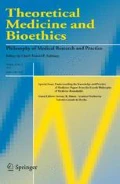Abstract
The terms “health”, “disease” and “illness” are frequently used in clinical medicine. This has misled philosophers into believing that these concepts are important for clinical thinking and decision making. For instance, it is held that decisions about whether or not to treat someone or whether to relieve someone of moral responsibility depend on whether the person has a disease. In this paper it is argued that the crucial role of the ‘disease’ concept is illusory. The health/disease distinction is irrelevant for most decisions and represents a conceptual straightjacket. Sophisticated and mature clinical decision making requires that we free ourselves from the concept of disease.
Similar content being viewed by others
References
Boorse C. On the distinction between disease and illness.Philosophy and Public Affairs 1975; 5: 49–68.
Boorse C. What a theory of mental health should be.Journal for the Theory of Social Behaviour 1976; 6: 61–84.
Boorse C. Health as a theoretical concept.Philosophy of Science 1977; 44: 542–73.
Engelhardt HT Jr. The concepts of health and disease. In: Engelhardt HT Jr, Spicker SF, eds.Evaluation and Explanation in the Biomedical Sciences. Dordrecht: D Reidel, 1975: 125–41.
King LS. What is disease?Philosophy of Science 1954: 21: 193–203.
Margolis J. The concept of disease.J Med Philos 1976: 1: 238–55.
Nordenfelt L.On the Nature of Health: An Action-Theoretic Approach. Dordrecht: D Reidel, 1987.
Bunzl M. Comment on “Health as a theoretical concept”.Philosophy of Science 1980; 47: 116–18.
Goosens WK. Values, health and medicine.Philosophy of Science 1980; 47: 100–15.
Caplan A. Does the philosophy of medicine exist?Theor Med 1992; 13: 67–77.
Wartofsky MW. Organs, organisms and disease: human ontology and medical practice. In: Engelhardt HT Jr, Spicker SF, eds.Evaluation and Explanation in the Biomedical Sciences. Dordrecht: D Reidel, 1975: 67–8.
Wulff HR, Andur Pedersen S, Rosenberg R.Philosophy of Medicine: An Introduction. Oxford: Blackwell Scientific Publications, 1986.
Andreoli TE, Carpenter CCJ, Plum F, Smith LH, eds.Cecil Essentials of Medicine. Philadelphia: Saunders, 1990.
Dawkins R.The Extended Phenotype. Oxford: Oxford university Press, 1986.
Dawkins R.The Blind Watchmaker. London: Longman, 1986.
Author information
Authors and Affiliations
Rights and permissions
About this article
Cite this article
Hesslow, G. Do we need a concept of disease?. Theoretical Medicine 14, 1–14 (1993). https://doi.org/10.1007/BF00993984
Issue Date:
DOI: https://doi.org/10.1007/BF00993984




